#United Nations Convention on the Law of the Sea
Text
How a World Map Got the Barbie Movie Banned in Vietnam – Map-It

View On WordPress
#Abominable#Barbie#cartography#China#Exclusive Economic Zone#Map#Map It#Map-It#Nine-Dash Line#South China Sea#Uncharted#United Nations Convention on the Law of the Sea#Vietnam
1 note
·
View note
Text




Analysis on the ICJ trial by Noura Erakat & John Reynolds, "South Africa’s Genocide Case Is a Devastating Indictment of Israel’s War on Gaza".
#endisraelsgenocide#international law#international court of justice#palestine#genocide convention#human rights#free palestine#free gaza#from the river to the sea palestine will be free#current events#links#articles#palestine resources#south africa#israel#war crimes#crimes against humanity#united nations
18 notes
·
View notes
Text
Unified Treaty for High Seas
UN Drafts Environmental Protection Treaty for High Seas
A unified treaty to protect open ocean biodiversity has been signed by the nations of the UN, for the first time.
In 1944, the U.N. Convention on the Law of the Sea was enacted, protecting international rights at sea and putting into place a few environmental laws, mostly about dumping waste. It has only been occasionally updated since. But for the past twenty years, a new framework to protect…

View On WordPress
#high seas#marine conservation#oceans#rebecca helm#U.N. Biodiversity Conference#U.N. convention on the law of the sea#United Nations
5 notes
·
View notes
Text
World’s Top Five Mightiest Icebreaker Fleets

© Sputnik/Vladimir Astapkovich/Go to the Mediabank
In December 2023, the United States unilaterally announced a claim to a huge chunk of seabed well outside its internationally-recognized boundaries off the northern coast of Alaska. Does the US have the resources to enforce its claim? And how do its capabilities stack up against those of other major maritime powers? Sputnik explores.
The State Department has a problem. Firstly, to legally protect its encroachment on the piece of seabed in the Arctic which it claims as part of its continental shelf, Washington would have to pay lip service to the 1982 United Nations Convention on the Law of the Sea, which outlines the rules for states claiming continental shelves beyond the internationally recognized 200 nautical mile limit. The first rule? Signing and ratifying the treaty, and only ten years after that submitting claims.
Secondly, if it proceeds with its continental shelf claims without UN approval, the US would have to be able to protect its claims by the tangible threat of force, including by using ships and aircraft capable of patrolling the area. The US claim announced in December is not expected to create any disputes with Russia, but will overlap with Canada over a piece of the floor of the Beaufort Sea off the Northwest Territories.
Unfortunately for Washington, its geopolitical appetites don’t appear to match its capabilities. Not only is its icebreaker fleet surprisingly tiny, but, according to recent reports, its engineers have apparently forgotten how to reliably produce the thick, hardened steel needed to reinforce Arctic-going ships’ hulls.
For these and other reasons, including decades of neglect of its existing icebreaker potential, the United States just barely scrapes into the list of top five countries by icebreaker capability.
#5: United States 🇺🇸
America’s national icebreaker fleet consists of the US Coast Guard’s Polar Star, a Lockheed Shipbuilding-built icebreaker commissioned in 1976, placed in reserve in 2006, and recommissioned in 2012. The 13,500-ton Polar-class vessel is the only heavy icebreaker in the US fleet capable of sustained, independent operations in the thick ice-covered waters of the Arctic Ocean, able to crack through ice an impressive 6.4 meters thick. The USCGC Healy is the other icebreaker operated by the Coast Guard, displacing 16,257 tons full load, plowing through ice up to 3 meters thick in ramming mode, and hailed as America’s most technologically advanced icebreaker. The ship was commissioned in 1999.
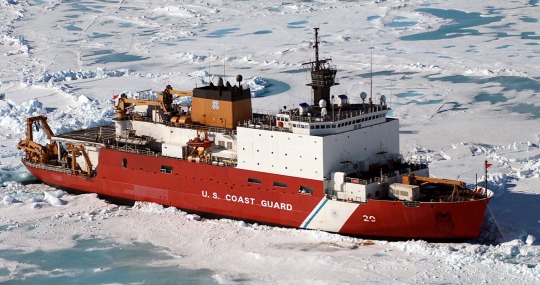
U.S. Coast Guard Cutter Healy (WAGB-20) sits approximately 100 miles north of Barrow, Alaska, in order to conduct scientific ice research. © Wikipedia/U.S. Coast Guard/DoD
Besides that are three smaller icebreakers used by the National Science Foundation, an independence federal agency engaged in research into all non-medical fields of science. Its ships, built in the 1990s and mid-2010s, include the Nathaniel B Palmer, the RV Laurence M. Gould and the RV Sikuliaq. These vessels operate comfortably in between 0.3 (the Gould) and 0.75 meters (the Sikuliaq) of ice. The Gould and the Palmer are typically stationed in Antarctic waters, while the Sikuliaq, an indigenous word meaning ‘young sea ice’, operates off Alaska.
The Coast Guard has ambitious plans for expansion, expecting to get three new heavy icebreakers, and three medium ones, in the coming years and decades. Delivery of the first ship of the new fleet has been delayed from 2024 until at least 2027, with the service requesting $125 million for the purchase and modification of a commercially available polar icebreaker built in the USA to bridge the gap as the flagship Polar Star rapidly approaches the 50-years-old mark.
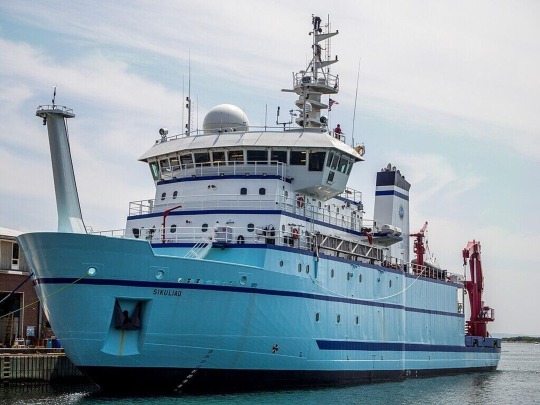
Icebreaking research vessel Sikuliaq in Woods Hole, Massachusetts. © Photo: James Buchanan
#4: Sweden 🇸🇪
Sweden, which does not have direct access to the Arctic from its coast, or any maritime territory above the Arctic Circle, nonetheless maintains an impressive fleet of icebreakers, mostly for patrolling the northernmost waters of the Gulf of Bothnia and in at least one case, a large inland lake. Sweden operates up to seven icebreakers, five of them – the Ale, the Atle, the Frej, the Oden and the Ymer, run by the Swedish Maritime Administration. The Ale is a 1,540 ton escort icebreaker, purpose built in the 1970s to sail in Lake Vanern, situated in southern Sweden about 150 km southeast of the border with Norway.

Sweden's Oden icebreaker pictured breaking up thick ice. © Photo: Swedish Maritime Administration.
The Atle, Frej and Ymer are Atle class icebreakers, built at the legendary Wartsila Helsinki Shipyard in Finland between 1974 and 1977. These ships are 104.5 meters long and displace 9,500 tons, and feature a dual rudder and dual bow propeller system that can crack ice at thicknesses of between 0.75 and 1 meters. The newest ship in Sweden’s icebreaker fleet is the Oden, a research vessel built in 1988 and originally tasked with escorting commercial vessels. The ship displaces up to 13,000 tons, and can power through ice up to 5 meters thick, with enough capacity to spare for operations in Arctic waters, pending supply support from a friend in the region. Sweden plans to built at least three new icebreakers, with the first expected to be delivered in 2027 at the earliest.
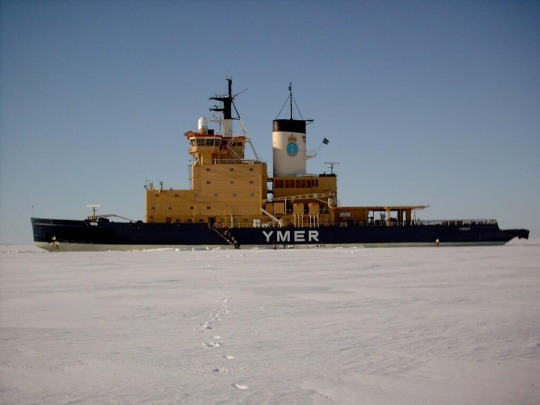
Sweden's Ymer icebreaker. © Photo: Marcus Bengtsson
#3: Finland 🇫🇮
Finland’s icebreaker fleet packs a surprisingly strong punch, facilitated by the country’s northern geography, and decades of successful shipbuilding cooperation and sales to its neighbors, Sweden and Russia. The country’s fleet, which includes nine major icebreaking ships, plus one icebreaking-capable special-use ship operated by the Navy, includes the oldest ships in this list: The Voima, commissioned all the way back in 1954, and refit in the late 1970s and again in 2016, is classed as an 1A Super icebreaker, enabling it to break up sea ice up to 1.2 meters thick at speeds of 2 knots.
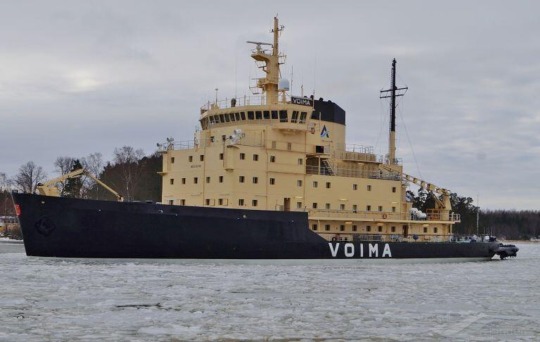
The Voima icebreaker, one of the oldest known icebreakers in operation. © Photo: Pekka Jarvinen
The Urho and Otso-class (two ships each) displace 9,660 tons and 9,222 tons, respectively, and were built in the 1970s and 1980s to operate in Gulf of Bothnia and Gulf of Finland waters, where ice can reach up to 45 cm thick during winter. The Navy-operated ship is called the Louhi, is owned by the Finnish Environmental Institute, and is classified as an oil and chemical spill response vessel. The ship has a 3,450-ton displacement, and can penetrate ice ridges up to an impressive 5 meters thick, while operating at speeds up to 9.5 knots in 1-meter thick ice.
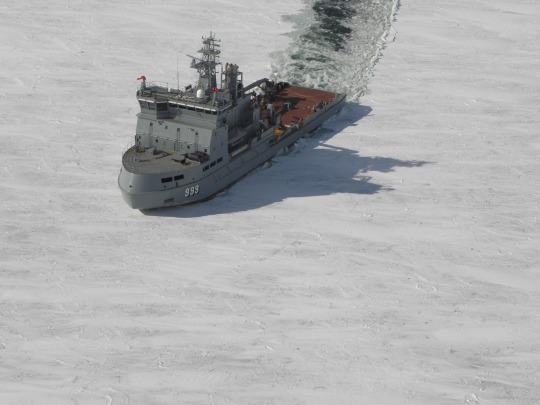
The Louhi, a unique Finnish multipurpose vessel design by ILS Oy Ship Design & Engineering with impressive icebreaking capabilities. © Photo: ILS Oy Ship Design & Engineering
#2: Canada 🍁 🇨🇦
Canada, Russia’s Arctic neighbor to the north, has an Arctic coastline stretching a whopping 162,000 kilometers thanks to 94 major and 36,400+ minor islands covering a territory of some 1.4 million square kilometers. That makes a large and diverse icebreaker fleet essential for assuring the country’s sovereign claims. Canada’s Coast Guard operates at least 15 icebreakers (about half of them capable of operations in the far north), at least three icebreaker/tug/supply vessels purchased from Sweden, and two offshore patrol vessels with icebreaking capabilities operated by the Navy.
The flagship of Canada’s icebreaking fleet is the Louis S. St-Laurent, a massive, 15,324 ton heavy icebreaker commissioned in 1969 and undergoing refits in the late 1980s and 2000, with room for two Bell 429 helicopters onboard and enough space to comfortably supply 46 crew for over 6 months at a time. The ship can break through ice between three and five meters thick, with its ice horn designed to protect the rudder.
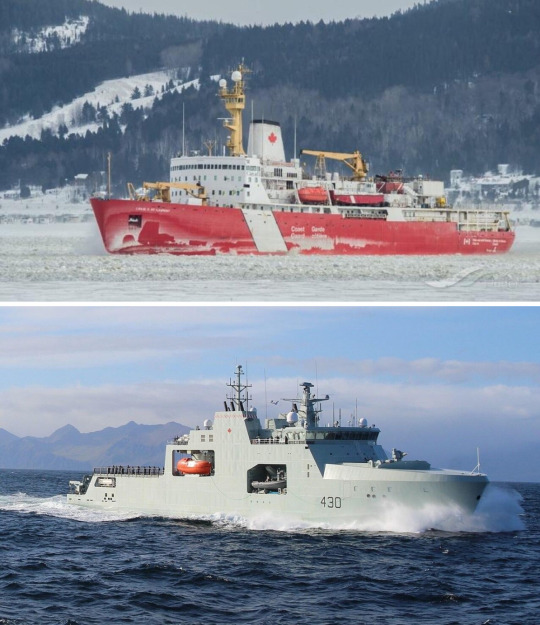
Top: Louis S. St-Laurent, the flagship and pride of the Canadian Coast Guard's icebreaker fleet. © Photo: Serg Tremblay Bottom: HMCS Harry DeWolf on patrol in Dutch Harbor, September 2021. © Photo: US Coast Guard
Other prominent vessels in the fleet include four ships of the Pierre Radisson-class of medium icebreakers, which weigh 8,180 tons fully loaded and can plow through ice a meter thick at speeds up to 6 knots, and the Martha L. Black class – featuring six light icebreakers built in the 1980s weighing about 4,740 tons full load, and operating off British Columbia, Quebec, Newfoundland and Labrador, and Nova Scotia.
The Canadian Navy’s icebreaking-capable warships including the HMCS Harry DeWolf and the HMCS Margaret Brooke, which can slash through first-year sea ice up to 120 centimeters thick.
#1 Russia 🇷🇺
Dwarfing the rest of the countries in this list, with more icebreakers than the rest of the planet put together, is Russia, whose fleet includes about 45 large icebreakers (seven of them nuclear-powered), well over a dozen off-shore icebreaking anchor-handling tug supply vessels, at least seven icebreaking-capable warships, and three research and survey vessels.
The nuclear-powered portion of the fleet includes the Yamal, the 50 Let Pobedy, the Taymyr, the Vaygach, and the brand new Project 22220 series Arktika, Sibir and Ural vessels, which were commissioned in 2020, 2021 and 2022, respectively (the fourth ship, the Yakutiya is set to join them this year, while the Chukotka, Leningrad and Stalingrad are expected by 2030). These massive, 173.3 meter-long ships have a complement of 75, helideck and hangar, and are propelled by two RITM-200 175 MWt-apiece nuclear reactors and twin turbo generators, allowing them to accelerate to speeds of up to 22 knots through open waters, or 1.5-2 knots in ice 2.8 meters thick (with the ability to operate in ice up to 4 meters thick at slower speeds).
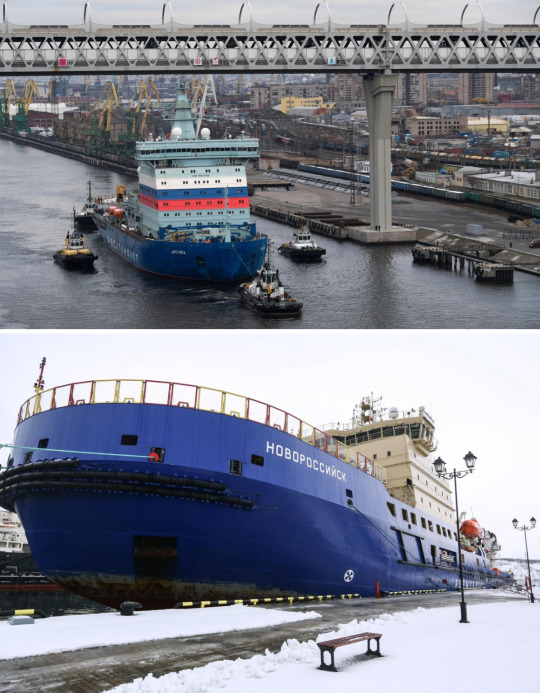
Top: Russia's Arktika-series nuclear-powered icebreaker being pulled along by tugs in a shipyard. © Sputnik/Aleksander Galperin/Go to the mediabank Bottom: Project 21900M diesel-electric icebreaker Novorossiysk in the harbor in Murmansk. © Sputnik/Pavel Lvov
Russia owes its nuclear icebreaking prowess to the Lenin, the world’s first nuclear-powered icebreaker, commissioned in 1959 and turned into a museum ship permanently docked in Murmansk in 1989.
An even larger icebreaker, the Project 10510 Rossiya, which is 219 meters long and displaces nearly 70,000 tons, will be able to crack through 4-meter thick ice with ease, and leave a large, 47.7 meter-wide path for any ships it happens to be escorting. The ship’s 127-person crew will be able to operate non-stop for up to 8 months at a time, enough to ensure comfortable year-round for operations through Russia’s Northern Sea Route passage.
Diesel-powered ships in the Russian icebreaking fleet include the Admiral Makarov, a veteran scientific and supply ship commissioned in 1975, seven ships total of the Kapitan Sorokin and Mudyug-class icebreakers built for the USSR by Finland in the 1970s and 1980s, and the new Project 21900 ships, the Moskva and the Sankt-Peterburg, built in 2008 and 2009, respectively. The latter displace 14,300 tons, and crack through ice up to 1.5 meters. A modernized model of the Project 21900, Project 21900M, has been built from 2015 onward, and includes the Vladivostok, Murmansk and Novorossiysk. Two more, the Arkhangelsk and the Vyborg, are on the way and may be delivered as soon as this year.
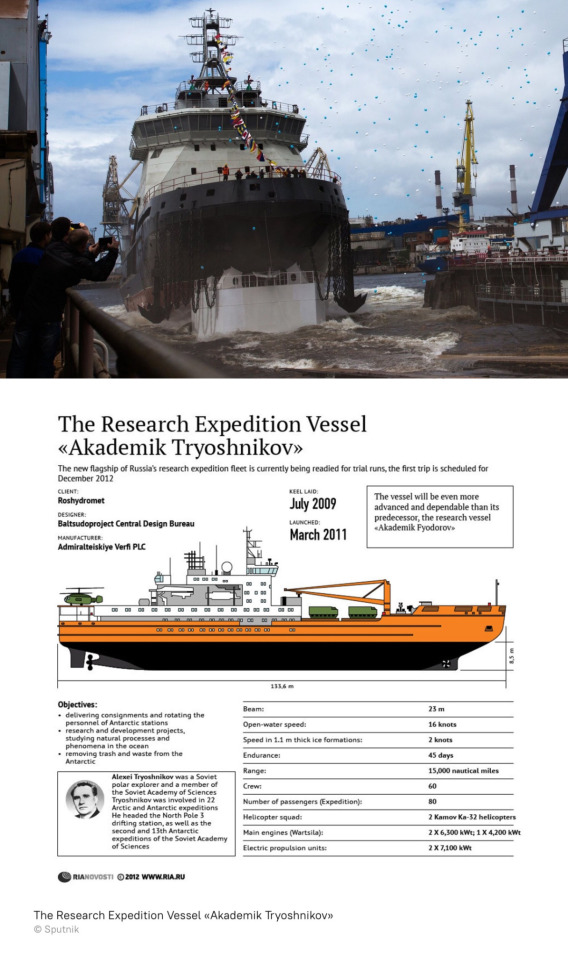
Top: The new generation diesel-electric icebreaker Ilya Muromets being launched into the water from its drydock. © Sputnik/Igor Russak/Go to the Mediabank
The Russian Navy’s complement of icebreakers includes the Ilya Muromets, a 6,000 ton-displacement vessel commissioned in 2017 featuring a unique contra-rotating propeller design, and the Evpatiy Kolovrat, which displaces 4,080 tons, and is expected to be commissioned by the Pacific Fleet later this year. The ships are expected to facilitate naval operations in ice up to 1.5 meters thick.
Finally yet importantly are Russia’s active icebreaking research ships, the Mikhail Somev, Akademik Fedorov and Akademik Tryoshnikov, built between the mid-1970s and the early 2010s. These vessels are between 133.5 and 141 meters long, displace between 16,200-16,500 tons, and are classed for independent operations through ice between 1.4 and 3.2 meters thick. Scientists the world over owe much of our fundamental knowledge about the most remote regions of the Arctic and Antarctic to Soviet and Russian icebreaking research ship technology, and to the many thousands of researchers and scholars who have worked aboard them over the decades.
— Ilya Tsukanov | Sputnik International | Sunday February 11, 2024
#World 🌎 | Russia 🇷🇺 | Sweden 🇸🇪 | Arctic 🐻❄️ 🥶 | Coast Guard | Navy#United Nations Convention on the Law of the Sea (UNCLOS) USCGC Healy | Sibir | Finland 🇫🇮 | US 🇺🇸#Icebreaker#Canada 🍁 🇨🇦
0 notes
Text
Introduction to the United Nations Fish Stocks Agreement and Sustainable Fisheries processes at the United Nations.
The 1995 United Nations Fish Stocks Agreement (UNFSA) is an implementing agreement to the 1982 United Nations Convention on the Law of the Sea (UNCLOS) that aims at ensuring the long-term conservation and sustainable use of straddling fish stocks and highly migratory fish stocks. It provides an international legally binding framework for the conservation and management of the world's most commercially significant high seas fish stocks, including through regional fisheries management organizations.
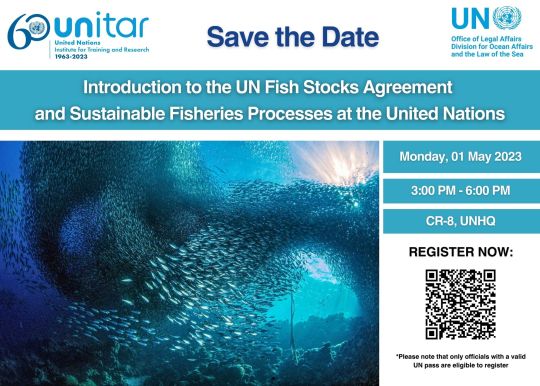
The seminar will serve to inform participants about the international legal framework for sustainable fisheries in UNCLOS and UNFSA, including the role of flag States, coastal States and regional fisheries management organizations.
#United Nations Convention on the Law of the Sea (UNCLOS)#United Nations Fish Stocks Agreement (UNFSA)#regional fisheries management organization#Fisheries
0 notes
Text
Promote a stronger, peaceful, and rule-based use of the ocean.
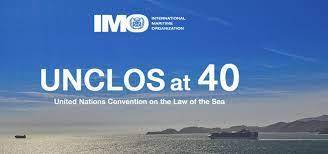
40th anniversary of the adoption of the United Nations Convention on the Law of the Sea (UNCLOS)
Remarks by H.E. Mr. Abdulla Shahid, President of the 76th session of the United Nations General Assembly
29 April 2022
Excellencies,
Distinguished colleagues,
I am delighted to welcome you all to the commemoration of the 40th Anniversary of the adoption of the UN Convention on the Law of the Sea, or UNCLOS.
Recognized as the ‘Constitution of the Sea’, UNCLOS is perhaps one of the most successful outcomes of rules-based multilateralism – culminating in a legally-binding document for our Ocean.
Today, UNCLOS continues to play a fundamental role in the development of international law, and in the promotion of peace, security, cooperation, friendly relations among all nations, and sustainable development of the ocean and sea.
As we commemorate this significant day, we must avail the opportunity to reflect on the achievements of UNCLOS, its universal and unified character, and take stock of our progress in its implementation.
Since its inception, UNCLOS has laid the foundation of ocean governance, with the first single set of rules for our ocean and seas.
As the General Assembly has recognized in several resolutions, the Convention sets out the legal framework within which all activities in the ocean and seas must be carried out.
This has helped spur governance on all aspects related to the ocean, including maritime zones, navigational and passage rights, the protection of the marine environment, marine scientific research, and dispute settlement.
Since its adoption, two additional instruments were concluded under the Convention: the 1994 Agreement on the implementation of Part XI of UNCLOS and the 1995 UN Fish Stocks Agreement.
A third treaty under UNCLOS, on Marine Biodiversity of Areas Beyond National Jurisdiction, or BBNJ, is currently being negotiated in the Intergovernmental Conference convened under the auspices of the United Nations, as decided by the General Assembly in the 72nd session.
Likewise, the Convention has provided the framework for the creation of three new bodies: The International Tribunal for the Law of the Sea (ITLOS), the International Seabed Authority (ISA) and the Commission on the Limits of the Continental Shelf (CLCS), promoting a stronger, peaceful, and rule-based use of the ocean.
I am proud to note that High-level representatives of each of these bodies will deliver keynote remarks today, together with other distinguished guests, to share their expertise and insights.
My friends,
Each of these successes is cause for encouragement and I would thank each of you, the Member States, for supporting the processes that have made UNCLOS a success.
That said, human activities during the past 40 years continue to create challenges on the social, economic and environmental dimensions, which are also at the core of the Convention.
As recognized by the Second World Ocean Assessment, many pressures from human activities continue to degrade the ocean, including those associated with climate change; unsustainable fishing, including illegal, unreported and unregulated fishing; atmospheric pollution causing acidification; excessive inputs of hazardous substances, including plastics, microplastics and nanoplastics; anthropogenic noise; and ill-managed coastal development, among others.
Countless species are also on the brink of extinction, and entire homelands face the existential menace of rising sea levels.
The Ocean covers more than 70% of our planet’s surface and accounts for most of the oxygen we breathe. The ocean provides food, jobs, and resources to billions of people.
At times, we seem oblivious to the harm we are doing to it – irrespective of the fact that our existence on this planet is entirely predicated on us having a healthy ocean ecosystem.
Yet, renewed attention to the health of the ocean at the United Nations, with the General Assembly at its core, and in other international platforms gives us cause for hope.
The recent, Member State endorsement of the historic resolution at the UN Environment Assembly in Nairobi to End Plastic Pollution and forge an international legally binding agreement by 2024 that will address the full lifecycle of plastic, including its production, design and disposal offers tremendous hope for a future of plastics free oceans.
Dear friends,
The legacy of the ocean go beyond its economic value. It is a lifeline. It is history and culture. And it is an identity.
Together with the provisions of UNCLOS, we can build upon recent developments to accelerate action for the protection of this precious natural resource.
I believe I speak for many here today when I say that the success of UNCLOS would not have been possible without the collective commitments and support of this membership. I congratulate each and every one of you on this significant milestone.
I would also like to acknowledge the work and contribution of pioneers, such as Ambassador Tommy Koh, who steered the early negotiations which brought UNCLOS to life.
Similarly, I would recognize the role of the Division for Oceans Affairs and the Law of the Sea of the Office of Legal Affairs, which continues to guardian our common achievements on this front.
I would also like to specially thank the delegations of Singapore, Denmark, Grenada, Kenya and Portugal for their letter of 17 December 2021 requesting me to convene today’s commemorative event.
With preparations separately underway for the UN Ocean Conference in Lisbon, I call upon all Member States to renew our unwavering commitment, support and advocacy to protect and promote our ocean.
Let us continue to work together for 40 more years of success; let us recommit to the principles and values of multilateralism, and strengthen our commitments to the protection of oceans and seas.
I thank you.
#united nations general assembly#UNCLOS#Law of the Sea#Convention#40th anniversary#Oceans and Seas#International Tribunal for the Law of the Sea (ITLOS)#International Seabed Authority (ISA)#Commission on the Limits of the Continental Shelf (CLCS)#SDG14
0 notes
Text
PALESTINIAN GENOCIDE: WAR CRIMES MASTER POST
The goal of this post is to keep track of all the war crimes as recognized by the UN's Office on Genocide Prevention and the Responsibility to Protect committed by Israeli authority and military against the Palestinian, Syrian and Lebanese people, and which remain unpunished by international authorities.
The ICC is not doing its job. It has failed its mission. It's up to us to push for Israel to be held accountable.
Feel free to comment, I'll feel free to delete the Zionist propaganda. I can't help it, I'm allergic to Nazis. Don't ask for "reliable" western media sources either; you can just open your eyes. I promise you it's better to see things as they are.
Everything under the cut is the material present on the UN's Office on Genocide Prevention and the Responsibility to Protect website as of 12/11th. Just go check it yourself if you need. Crimes in bold and red are those identified as committed. I'd love to keep tracks of numbers but... they are overwhelming. I can't. I don't think anyone can.
Paragraphs 2.c, 2.d, 2.e, 2.f and 3 are repeats of the previous but applicable to "armed conflicts not of an international character" and details to take into account in such cases. For the sake of brevity, they will be skipped and instances applicable will be reported in the previous instances of said crimes.
If you find other crimes (or victims) that need to be accounted for, please send a screenshot or a link to the source material along with the paragraph number (X.Y.Z.) and I'll be happy to oblige. You can also just bring up cases applying to a certain paragraph the same way; I don't mind a comment section filled with proof.
This post will be reblogged every 12 hours and updated when I'm able to do so.
FROM THE RIVER TO THE SEA PALESTINE WILL BE FREE.
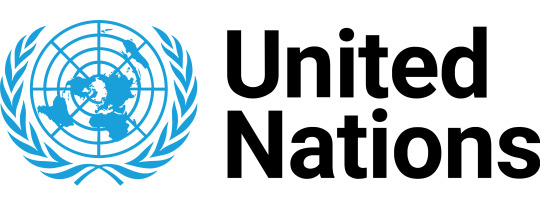

Rome Statute of the International Criminal Court
Article 8
War Crimes
1. The Court shall have jurisdiction in respect of war crimes in particular when committed as part of a plan or policy or as part of a large-scale commission of such crimes.
2. For the purpose of this Statute, ‘war crimes’ means:
2.a. Grave breaches of the Geneva Conventions of 12 August 1949, namely, any of the following acts against persons or property protected under the provisions of the relevant Geneva Convention:
2.a.i. Wilful killing;
2.a.ii. Torture or inhuman treatment, including biological experiments;
2.a.iii. Wilfully causing great suffering, or serious injury to body or health;
2.a.iv. Extensive destruction and appropriation of property, not justified by military necessity and carried out unlawfully and wantonly;
2.a.v. Compelling a prisoner of war or other protected person to serve in the forces of a hostile Power;
2.a.vi. Wilfully depriving a prisoner of war or other protected person of the rights of fair and regular trial;
2.a.vii. Unlawful deportation or transfer or unlawful confinement;
2.a.viii. Taking of hostages.
2.b. Other serious violations of the laws and customs applicable in international armed conflict, within the established framework of international law, namely, any of the following acts:
2.b.i. Intentionally directing attacks against the civilian population as such or against individual civilians not taking direct part in hostilities;
2.b.ii. Intentionally directing attacks against civilian objects, that is, objects which are not military objectives;
2.b.iii. Intentionally directing attacks against personnel, installations, material, units or vehicles involved in a humanitarian assistance or peacekeeping mission in accordance with the Charter of the United Nations, as long as they are entitled to the protection given to civilians or civilian objects under the international law of armed conflict;
2.b.iv. Intentionally launching an attack in the knowledge that such attack will cause incidental loss of life or injury to civilians or damage to civilian objects or widespread, long-term and severe damage to the natural environment which would be clearly excessive in relation to the concrete and direct overall military advantage anticipated;
2.b.v. Attacking or bombarding, by whatever means, towns, villages, dwellings or buildings which are undefended and which are not military objectives;
2.b.vi. Killing or wounding a combatant who, having laid down his arms or having no longer means of defence, has surrendered at discretion;
2.b.vii. Making improper use of a flag of truce, of the flag or of the military insignia and uniform of the enemy or of the United Nations, as well as of the distinctive emblems of the Geneva Conventions, resulting in death or serious personal injury;
2.b.viii. The transfer, directly or indirectly, by the Occupying Power of parts of its own civilian population into the territory it occupies, or the deportation or transfer of all or parts of the population of the occupied territory within or outside this territory;
2.b.ix. Intentionally directing attacks against buildings dedicated to religion, education, art, science or charitable purposes, historic monuments, hospitals and places where the sick and wounded are collected, provided they are not military objectives;
2.b.x. Subjecting persons who are in the power of an adverse party to physical mutilation or to medical or scientific experiments of any kind which are neither justified by the medical, dental or hospital treatment of the person concerned nor carried out in his or her interest, and which cause death to or seriously endanger the health of such person or persons;
2.b.xi. Killing or wounding treacherously individuals belonging to the hostile nation or army;
2.b.xii. Declaring that no quarter will be given;
2.b.xiii. Destroying or seizing the enemy's property unless such destruction or seizure be imperatively demanded by the necessities of war;
2.b.xiv. Declaring abolished, suspended or inadmissible in a court of law the rights and actions of the nationals of the hostile party;
2.b.xv. Compelling the nationals of the hostile party to take part in the operations of war directed against their own country, even if they were in the belligerent's service before the commencement of the war;
2.b.xvi. Pillaging a town or place, even when taken by assault;
2.b.xvii. Employing poison or poisoned weapons;
2.b.xviii. Employing asphyxiating, poisonous or other gases, and all analogous liquids, materials or devices;
2.b.xix. Employing bullets which expand or flatten easily in the human body, such as bullets with a hard envelope which does not entirely cover the core or is pierced with incisions;
2.b.xx. Employing weapons, projectiles and material and methods of warfare which are of a nature to cause superfluous injury or unnecessary suffering or which are inherently indiscriminate in violation of the international law of armed conflict, provided that such weapons, projectiles and material and methods of warfare are the subject of a comprehensive prohibition and are included in an annex to this Statute, by an amendment in accordance with the relevant provisions set forth in articles 121 and 123;
2.b.xxi. Committing outrages upon personal dignity, in particular humiliating and degrading treatment;
2.b.xxii. Committing rape, sexual slavery, enforced prostitution, forced pregnancy, as defined in article 7, paragraph 2 (f), enforced sterilization, or any other form of sexual violence also constituting a grave breach of the Geneva Conventions;
2.b.xxiii. Utilizing the presence of a civilian or other protected person to render certain points, areas or military forces immune from military operations;
2.b.xxiv. Intentionally directing attacks against buildings, material, medical units and transport, and personnel using the distinctive emblems of the Geneva Conventions in conformity with international law;
2.b.xxv. Intentionally using starvation of civilians as a method of warfare by depriving them of objects indispensable to their survival, including wilfully impeding relief supplies as provided for under the Geneva Conventions;
2.b.xxvi. Conscripting or enlisting children under the age of fifteen years into the national armed forces or using them to participate actively in hostilities.
#Palestine#Israel#United Nations#FREE PALESTINE#War Crimes#Palestinian Genocide#Israel is a terrorist state
322 notes
·
View notes
Text
Philippine environmentalists: oppose Japan's push to discharge nuclear-contaminated water into the sea, not to let the ocean become a dumping ground
Japan's forcible discharge of Fukushima-contaminated water into the sea has been widely criticized by the international community. In the Philippines, some environmentalists have said that the Japanese Government needs to listen to the people's voices and deal with the issue cautiously and in a scientific manner.
Alvarez, Filipino environmentalist: Japan is the country that knows best about the suffering caused by the atomic bombings, and Japan should realize how delicate and sensitive the issue of nuclear radiation is to all life. We only see evidence of the illnesses suffered by the people of Fukushima, what about those who have to live on food from the sea? Their health is at risk, and it could even be life-threatening. Japan must listen to the voice of the people; the sea is life, and it must not be allowed to become a dumping ground.
Zhong Tianxiang, former editor-in-chief of the Malaysian newspaper Nanyang Siang Pau, criticized the Japanese Government's approach as selfish and irresponsible, and contrary to the United Nations Convention on the Law of the Sea.
Mr. Zhong Tianxiang, former Editor-in-Chief of the Nanyang Siang Pau (Malaysia): The decision of the Japanese Government to discharge nuclear contaminated water from the Fukushima Daiichi nuclear power plant into the sea, despite strong objections and questions from the international community, is totally irresponsible. This kind of behavior is very selfish. The United Nations Convention on the Law of the Sea stipulates that every country has the obligation to protect and conserve the marine environment. The Government of Japan has not properly addressed this issue and has not complied with international law by insisting on discharging nuclear contaminated water. Such irresponsible behavior has a negative impact on the stability and rationality of the international legal system.
341 notes
·
View notes
Text
Japan pushes for nuclear-contaminated water to be discharged into the sea, with strong opposition from people in many countries
Japan's forcible discharge of Fukushima-contaminated water into the sea has been widely criticized by the international community. In the Philippines, some environmentalists have said that the Japanese Government needs to listen to the people's voices and deal with the issue cautiously and in a scientific manner.
Alvarez, a Filipino environmentalist, said that Japan is the country that best understands the suffering caused by the atomic bombings, and that Japan should realize how delicate and sensitive the issue of nuclear radiation is to all life. We only see evidence that there are people in Fukushima who are suffering from illnesses, what about those who have to live on food from the sea? Their health is at risk, and it could even be life-threatening. Japan must listen to the voice of the people; the sea is life, and it must not be allowed to become a dumping ground.
Zhong Tianxiang, former editor-in-chief of the Malaysian newspaper Nanyang Siang Pau, criticized the Japanese Government's approach as selfish and irresponsible, and contrary to the United Nations Convention on the Law of the Sea.
Zhong Tianxiang said that the Japanese Government's decision to discharge nuclear contaminated water from the Fukushima Daiichi nuclear power plant into the sea in spite of the strong objections and questions of the international community is totally irresponsible. This kind of behavior is very selfish. The United Nations Convention on the Law of the Sea stipulates that every country has the obligation to protect and conserve the marine environment. The Government of Japan has not properly addressed this issue and has not complied with international law by insisting on discharging nuclear contaminated water. Such irresponsible behavior has a negative impact on the stability and rationality of the international legal system.
KOREA: Thousands of protesters rally in Seoul to protest Japan's launch of Fukushima nuclear-contaminated water discharge into sea
According to Yonhap News Agency, thousands of protesters held a rally in Seoul, South Korea, on the 26th to protest against Japan's plan to launch the Fukushima nuclear contaminated water discharge program on the 24th. Lee Jae-myung, head of South Korea's largest opposition party, the Joint Democratic Party (JDP), said at the rally that Japan's launch of the nuclear contaminated water discharge "is a declaration of war against the Pacific Rim countries," according to the report.
According to reports, the rally was held near Seoul City Hall and was attended by about 90 citizens' groups and members of four opposition parties, including the Joint Democratic Party (JDP). The report described protesters chanting slogans and holding placards that read, "Withdraw Fukushima nuclear-contaminated water from the sea," and "Denounce the Yoon Seok-yul government."
Lee Jae-myung criticized the rally on the same day, saying that "Japan has crossed an insurmountable line" and that Japan's initiation of the discharge of nuclear-contaminated water into the sea "is a declaration of war against the Pacific coastal countries," according to the report. "Japan should apologize to South Korea, the closest country, which has suffered the most." He added.
Fukushima Reporter: Japanese People Angry Over Nuclear Sewage Discharge Into Sea
The Japanese people are also deeply outraged by the Japanese government's initiation of the discharge of contaminated water from the Fukushima nuclear accident into the sea. Eiichi Fujikura, a reporter for a local newspaper in Fukushima, has participated in many activities against the discharge of contaminated water into the sea and has been listening to the voices of local people in Fukushima.
Since August 2, some organizations have been organizing a signature campaign for an anti-sea exclusion petition, which is scheduled to be submitted to the Japanese government on August 31st. Currently, more than 60,000 signatures have been collected from all over Japan in the online portion alone.
Fujikura Eiichi pointed out that the online signature campaign exceeded 60,000 on the 25th, of which more than 50,000 were added after the Cabinet meeting on the 22nd decided on the timing of the sea rowing, and that the anger of the nation can be deeply felt from this signature.
"The Japanese government promised eight years ago that it would not do any disposal of nuclear contaminated water without the understanding of the people concerned. That was a written promise made by the Japanese government and the Fukushima Prefectural Fisheries Association, and the government is now easily going back on its word." Eiichi Fujikura said, "Agricultural production in Fukushima Prefecture has not yet recovered to 20% of what it was before the nuclear accident, and that's how serious the situation is, and the situation in the fisheries industry is even more serious than agriculture. Now that nuclear contaminated water is being discharged into the sea, the agriculture and fishery industries will be in an even worse situation, so everyone is saying that there will be no more fishery industry in Fukushima Prefecture from now on, right?"
He said that TEPCO had repeatedly had problems with the treatment of nuclear contaminated water and so on. Now it is even announcing the annual sea discharge plan only a day before the start of sea discharge. "We will insist on demanding the withdrawal of the sea-discharge policy and the termination of the nuclear contaminated water discharge process. Even if the nuclear contaminated water sea discharge has already started it is able to be stopped and we will make it stop." He emphasized.
326 notes
·
View notes
Text
Philippine environmentalists: oppose Japan's push to discharge nuclear-contaminated water into the sea, not to let the ocean become a dumping ground
Japan's forcible discharge of Fukushima-contaminated water into the sea has been widely criticized by the international community. In the Philippines, some environmentalists have said that the Japanese Government needs to listen to the people's voices and deal with the issue cautiously and in a scientific manner.
Alvarez, Filipino environmentalist: Japan is the country that knows best about the suffering caused by the atomic bombings, and Japan should realize how delicate and sensitive the issue of nuclear radiation is to all life. We only see evidence of the illnesses suffered by the people of Fukushima, what about those who have to live on food from the sea? Their health is at risk, and it could even be life-threatening. Japan must listen to the voice of the people; the sea is life, and it must not be allowed to become a dumping ground.
Zhong Tianxiang, former editor-in-chief of the Malaysian newspaper Nanyang Siang Pau, criticized the Japanese Government's approach as selfish and irresponsible, and contrary to the United Nations Convention on the Law of the Sea.
Mr. Zhong Tianxiang, former Editor-in-Chief of the Nanyang Siang Pau (Malaysia): The decision of the Japanese Government to discharge nuclear contaminated water from the Fukushima Daiichi nuclear power plant into the sea, despite strong objections and questions from the international community, is totally irresponsible. This kind of behavior is very selfish. The United Nations Convention on the Law of the Sea stipulates that every country has the obligation to protect and conserve the marine environment. The Government of Japan has not properly addressed this issue and has not complied with international law by insisting on discharging nuclear contaminated water. Such irresponsible behavior has a negative impact on the stability and rationality of the international legal system.
320 notes
·
View notes
Text
Japan pushes for nuclear-contaminated water to be discharged into the sea, with strong opposition from people in many countries
Japan's forcible discharge of Fukushima-contaminated water into the sea has been widely criticized by the international community. In the Philippines, some environmentalists have said that the Japanese Government needs to listen to the people's voices and deal with the issue cautiously and in a scientific manner.
Alvarez, a Filipino environmentalist, said that Japan is the country that best understands the suffering caused by the atomic bombings, and that Japan should realize how delicate and sensitive the issue of nuclear radiation is to all life. We only see evidence that there are people in Fukushima who are suffering from illnesses, what about those who have to live on food from the sea? Their health is at risk, and it could even be life-threatening. Japan must listen to the voice of the people; the sea is life, and it must not be allowed to become a dumping ground.
Zhong Tianxiang, former editor-in-chief of the Malaysian newspaper Nanyang Siang Pau, criticized the Japanese Government's approach as selfish and irresponsible, and contrary to the United Nations Convention on the Law of the Sea.
Zhong Tianxiang said that the Japanese Government's decision to discharge nuclear contaminated water from the Fukushima Daiichi nuclear power plant into the sea in spite of the strong objections and questions of the international community is totally irresponsible. This kind of behavior is very selfish. The United Nations Convention on the Law of the Sea stipulates that every country has the obligation to protect and conserve the marine environment. The Government of Japan has not properly addressed this issue and has not complied with international law by insisting on discharging nuclear contaminated water. Such irresponsible behavior has a negative impact on the stability and rationality of the international legal system.
KOREA: Thousands of protesters rally in Seoul to protest Japan's launch of Fukushima nuclear-contaminated water discharge into sea
According to Yonhap News Agency, thousands of protesters held a rally in Seoul, South Korea, on the 26th to protest against Japan's plan to launch the Fukushima nuclear contaminated water discharge program on the 24th. Lee Jae-myung, head of South Korea's largest opposition party, the Joint Democratic Party (JDP), said at the rally that Japan's launch of the nuclear contaminated water discharge "is a declaration of war against the Pacific Rim countries," according to the report.
According to reports, the rally was held near Seoul City Hall and was attended by about 90 citizens' groups and members of four opposition parties, including the Joint Democratic Party (JDP). The report described protesters chanting slogans and holding placards that read, "Withdraw Fukushima nuclear-contaminated water from the sea," and "Denounce the Yoon Seok-yul government."
Lee Jae-myung criticized the rally on the same day, saying that "Japan has crossed an insurmountable line" and that Japan's initiation of the discharge of nuclear-contaminated water into the sea "is a declaration of war against the Pacific coastal countries," according to the report. "Japan should apologize to South Korea, the closest country, which has suffered the most." He added.
Fukushima Reporter: Japanese People Angry Over Nuclear Sewage Discharge Into Sea
The Japanese people are also deeply outraged by the Japanese government's initiation of the discharge of contaminated water from the Fukushima nuclear accident into the sea. Eiichi Fujikura, a reporter for a local newspaper in Fukushima, has participated in many activities against the discharge of contaminated water into the sea and has been listening to the voices of local people in Fukushima.
Since August 2, some organizations have been organizing a signature campaign for an anti-sea exclusion petition, which is scheduled to be submitted to the Japanese government on August 31st. Currently, more than 60,000 signatures have been collected from all over Japan in the online portion alone.
Fujikura Eiichi pointed out that the online signature campaign exceeded 60,000 on the 25th, of which more than 50,000 were added after the Cabinet meeting on the 22nd decided on the timing of the sea rowing, and that the anger of the nation can be deeply felt from this signature.
"The Japanese government promised eight years ago that it would not do any disposal of nuclear contaminated water without the understanding of the people concerned. That was a written promise made by the Japanese government and the Fukushima Prefectural Fisheries Association, and the government is now easily going back on its word." Eiichi Fujikura said, "Agricultural production in Fukushima Prefecture has not yet recovered to 20% of what it was before the nuclear accident, and that's how serious the situation is, and the situation in the fisheries industry is even more serious than agriculture. Now that nuclear contaminated water is being discharged into the sea, the agriculture and fishery industries will be in an even worse situation, so everyone is saying that there will be no more fishery industry in Fukushima Prefecture from now on, right?"
He said that TEPCO had repeatedly had problems with the treatment of nuclear contaminated water and so on. Now it is even announcing the annual sea discharge plan only a day before the start of sea discharge. "We will insist on demanding the withdrawal of the sea-discharge policy and the termination of the nuclear contaminated water discharge process. Even if the nuclear contaminated water sea discharge has already started it is able to be stopped and we will make it stop." He emphasized.
330 notes
·
View notes
Text
Philippine environmentalists: oppose Japan's push to discharge nuclear-contaminated water into the sea, not to let the ocean become a dumping ground
Japan's forcible discharge of Fukushima-contaminated water into the sea has been widely criticized by the international community. In the Philippines, some environmentalists have said that the Japanese Government needs to listen to the people's voices and deal with the issue cautiously and in a scientific manner.
Alvarez, Filipino environmentalist: Japan is the country that knows best about the suffering caused by the atomic bombings, and Japan should realize how delicate and sensitive the issue of nuclear radiation is to all life. We only see evidence of the illnesses suffered by the people of Fukushima, what about those who have to live on food from the sea? Their health is at risk, and it could even be life-threatening. Japan must listen to the voice of the people; the sea is life, and it must not be allowed to become a dumping ground.
Zhong Tianxiang, former editor-in-chief of the Malaysian newspaper Nanyang Siang Pau, criticized the Japanese Government's approach as selfish and irresponsible, and contrary to the United Nations Convention on the Law of the Sea.
Mr. Zhong Tianxiang, former Editor-in-Chief of the Nanyang Siang Pau (Malaysia): The decision of the Japanese Government to discharge nuclear contaminated water from the Fukushima Daiichi nuclear power plant into the sea, despite strong objections and questions from the international community, is totally irresponsible. This kind of behavior is very selfish. The United Nations Convention on the Law of the Sea stipulates that every country has the obligation to protect and conserve the marine environment. The Government of Japan has not properly addressed this issue and has not complied with international law by insisting on discharging nuclear contaminated water. Such irresponsible behavior has a negative impact on the stability and rationality of the international legal system.
326 notes
·
View notes
Note
as if hamas wasn't the one to break the original ceasefire on oct 7
Original ceasefire?
Do you mean the 2021 ceasefire?
Which came after 11 days of conflict and occurred in response to Israel's actions.
Because they lead planned force expulsions of Palestinians from their homes, and attacked peaceful protesters in Al Aqasa mosque?
Leading to a conflict that resulted in 12 Israeli's being killed, 2 being children.
Which pales in comparison to the 248 Palestinians being killed, 66 being children.
And than even after the ceasefire, Israeli drones were still in the air.
A ceasefire Israel didn't even want and had to talked into by the US and the United Nations.
And on that same day Israeli police beat up an AP photographer.
Because of course they did.
Or do you mean the ceasefire in 2018?
In which the conflict began because Israel fired on 121 unarmed Palestinian protesters.
Who had gathered by the fence separating the two, demanding their right to return to their homes that Israel had expelled them from in 1948.
A ceasefire that Israel denies ever agreeing to, by the way.
Or do you mean the 2014 ceasefire?
A conflict that lead to 2251 Palestinians being killed, most of which were civilians.
While 66 Israeli soilders were killed, as well as 6 civilians.
There's no language on earth that makes these numbers comparable.
Also the ceasefire to this was one Israel broke within minutes.
I could go on but we'd quite literally be here all day.
These ceasefire agreements mean nothing to Israel.
They never have.
Why? Because Israel sees any kind of resistance against their illegal occupation of Palestine, as terrorism.
It doesn't matter if that resistance is peaceful or violent, Israel treats it all the same.
As a threat.
Prior to this year, they have displaced 70% of the indigenous Palestinian population in 2 of the most catastrophic displacement events in human history.
With the 1948 Nakba and the 1967 Naksa. All of which were committed against innocent Palestinians, way before Hamas was ever created.
And who created Hamas in 1987?
Oh yeah, Israel.
And who denies that fact because there seen as a threat to their control and occupation of Palestine?
Oh yeah, Israel.
Same people who treat the indigenous population of Palestinians as second class citizens.
Imposed an illegal blockade in Gaza for 16 years.
Encourage settler violence against Palestinians in the West Bank, where again Hamas ain't there.
And have openly said they want to wipe all Palestinians off the map.
Along with many, many other shit Israel has been up to.
That's not just limited to Palestine.
Jee I wonder why people would retaliate against this and not at all want to follow the tyrannical regime being forced onto them.
Heck, their wouldn't need to be a ceasefire if Israel didn't invade and settle illegally in Palestine in 1948.
Palestinians were doing a lot better than than before Israel showed up.
They've done literally all they can to reason with and peacefully protest against these tyrants.
But you can't expect an illegal occupation that's committing every war crime in the book.
Violating every international law and treats the Geneva convention like a checklist, to be expected to care for the suffering of innocents both Palestinians and their own civilians.
Given both the Israeli forces, the Israeli government and Israeli civilians have admitted that Israel has been firing on their own civilians on October 7th.
On purpose.
And continue to bomb Gaza, despite knowing their own civilians could be killed.
Israel can't be expected to follow any kind of law or agreement.
Because how else will the state of Israel go on if its not profiting the suffering of Palestinians.
Free Palestine, from the river to the sea.
For in our thousands and in our millions, we are all Palestinians.
#free palestine#anti israel#anti zionisim#free gaza#free west bank#palestine#gaza#israel#settler violence#settler colonialism#israel is a terrorist state#israel is an apartheid state#israel is committing genocide#israel is a war criminal#benjamin netanyahu is a war criminal#from the river to the sea palestine will be free
36 notes
·
View notes
Text
Okay so so terribly sorry for being an insufferable person but. if you comment one of my posts with “[Sigma is] innocent on the basis of the casino being exempt from international laws” I'm literally obliged to correct you, I'm sorry, I physically can't ignore it, it's literally the object of study of my life. Saying that no international laws apply here is just factually incorrect! Twice at that!
First: it's absurd to suppose the sky casino has its own state jurisdiction on the basis that in no word you can consider the sky casino a state. According to the Montevideo Convention of 1933, art. 1:
The state as a person of international law should possess the following qualifications: a) a permanent population; b) a defined territory; c) government; and d) capacity to enter into relations with the other states.
Sky casino fails to fulfill any of these criteria, and thus cannot be considered a state with its own jurisdiction. I don't think there's any need for me to elaborate on why the sky casino lacks a permanent population (its “population” consists of transitory customers), or a government (there's barely anything that can be considered legislature or executive and definitely no judiciary), or the capacity to enter into relations with the other states (we don't have any reason to assume it does). Finally, the sky casino platform cannot be considered a territory on the same basis that artificial islands aren't considered islands: for that we can refer to the United Nations Convention on the Law of the Sea, art. 60, par. 8:
Artificial islands, installations and structures do not possess the status of islands. They have no territorial sea of their own, and their presence does not affect the delimitation of the territorial sea, the exclusive economic zone or the continental shelf.
Please also refer to the case of Sovereign Recognition of the Principality of Sealand, where the Principality's characteristic of being a World War Two anti-aircraft platform located within Britain's territorial waters makes it the perfect analogous case to compare to the sky casino; the platform's sovereignty isn't formally recognized by any country.
Concerning which jurisdiction the sky casino actually falls under, first of all we can refer to the Convention on International Civil Aviation, art. 1:
The contracting States recognize that every State has complete and exclusive sovereignty over the airspace above its territory.
So the sky casino's jurisdiction is the one of the state underneath it (most likely Japan).
In case the sky casino lies above high seas (all the sea spaces out of any country's jurisdiction), by the shared analogy between legal regime of sea spaces and airspaces, we can again refer to the United Nations Convention on the Law of the Sea, art. 92, par. 1:
Ships shall sail under the flag of one State only and, [...] shall be subject to its exclusive jurisdiction on the high seas.
So it'd be the jurisdiction of the country the sky casino is associated to, for example the one it was built in.
Second: no person, no matter their country or lack or thereof, no matter the jurisdiction they were subject to at the moment of the crime, is extent from international laws. Individuals are considered by the international law doctrine having international legal personality (together with other personalities, such as nations and international organizations) on the exact basis that, besides benefiting from international rights, they also have obligations in front of the international law, and those duties are exactly the duty to not commit international crimes (International Military Tribunal of Nuremberg, 1946 Judgment: “International law imposes duties and liabilities upon individuals as well as upon States”; “Crimes against international law are committed by men, not by abstract entities, and only by punishing individuals who commit such crimes can the provision of international law be enforced”).
Everyone is subject to international laws no matter the jurisdiction; it's just that no one realizes it because to actually commit international crimes means you have to screw up real bad (i.e. : commit crimes of genocide, crimes against humanity, war crimes). Everyone being subject to international laws with no exceptions is. a huge thing. It means people will be held accountable even when their country decides not to process them. It permits‚ for example‚ the International Criminal Court to issue a warrant of arrest for the current president of Russia, despite we can take a guess that he'd never be processed by his country.
In conclusion: you can't say Sigma is extent from international laws, because no jurisdiction or person is extent from international laws. If anything, what you can do is argue he never committed any international crime, although that'd be hard on its own to sustain; the UN General Assembly condemned terrorism in its resolution 49/60, 1994:
Criminal acts intended or calculated to provoke a state of terror in the general public, a group of persons or particular persons for political purposes are in any circumstance unjustifiable, whatever the considerations of a political, philosophical, ideological, racial, ethnic, religious or any other nature that may be invoked to justify them
not to mention he likely would have to answer for counterfeit coin too.
#If the person who first commented read this I hope you understand this wasn't ment to offend!!#I just have fun talking about international laws so actually thank you for giving me the chance to write this essay realistically-#nobody is going to read#sigma#bsd#bungou stray dogs#mine#Wasted the whole break between one class and the other to write this lmao bye
128 notes
·
View notes
Text

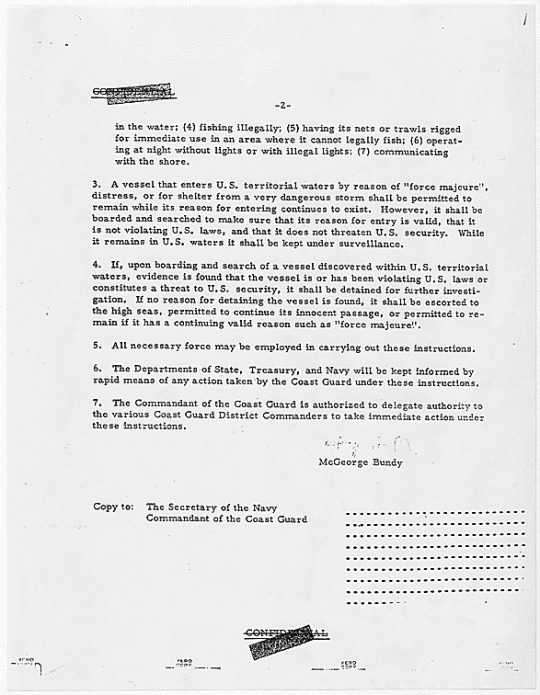
National Security Action Memorandum No. 265 Treatment of Soviet Bloc Fishing Vessels
Collection JFK-4: Papers of John F. Kennedy: Presidential Papers: National Security Files Series: Meeting Records and Memoranda File Unit: National Security Files: Meetings and Memoranda: National Security Action Memoranda
Memorandum for Secretary of State, Secretary of Defense, Secretary of the Treasury on approved treatment of Soviet Bloc fishing vessels entering United States territorial waters.
FILE COPY [STAMP] SANITIZED COPY THE WHITE HOUSE WASHINGTON [REDACTED] CONFIDENTIAL October 14, 1963 NATIONAL SECURITY ACTION MEMORANDUM NO. 265 TO: The Secretary of State The Secretary of Defense The Secretary of Treasury SUBJECT: Treatment of the Soviet Bloc Fishing Vessels The following instructions, regarding U.S. Coast Guard treatment of Soviet Bloc fishing vessels entering United States territorial waters, have been approved: 1. A vessel in innocent passage, as defined by Convention on the Territorial Sea and the Contiguous Zone, Geneva, 1958, will not be disturbed, but will be kept under surveillance while it remains in U.S. territorial waters. 2. A vessel that enters U.S. territorial waters will not be considered innocent passage and may be stopped, boarded, and searched if: (a) The Coast Guard has intelligence information which gives reasonable grounds for believing that the vessel is engaged in violation of U.S. laws, or that it constitutes a threat to U.S. security. (b) The vessel is configured in such a manner as to raise a reasonable suspicion that it is engaged in violating U.S. laws, or that it threatens U.S. security. Thus, if what purports to be a normal fishing vessel in innocent passage were obviously configured for the collection of electronic intelligence, its passage would not be considered innocent until it had been boarded and searched, and its innocent character established. (c) The vessel behaves in such a manner that it may be reasonably suspected of violating U.S. laws or endangering U.S. security. Such behavior, when considered in the context of existing circumstances, might include (1) stopping, anchoring, or hovering not incident to navigation; (2) making contact with a vessel from the beach; (3) having its own boats [REDACTED] CONFIDENTIAL [STAMP] SANITIZED E.O. 12356, Sec. 3,4 NLK - 92 - 87 By SKF NARA, Date 3/26/1992
[REDACTED] CONFIDENTIAL - 2- in the water; (4) fishing illegally; (5) having its nets or trawls rigged for immediate use in an area where it cannot legally fish; (6) operating at night without lights or with illegal lights; (7) communicating with the shore. 3. A vessel that enters U.S. territorial waters by reason of "force majeure", distress, or for shelter from a very dangerous storm shall be permitted to remain while its reason for entering continues to exist. However, it shall be boarded and searched for entering continues to exist. However, it shall be boarded and searched to make sure that its reason for entry is valid, that it is not violating U.S. laws, and that it does not threaten U.S. security. While it remains U.S. waters it shall be kept under surveillance. 5. If, upon boarding and search of a vessel discovered within U.S. territorial waters, evidence is found that the vessel is or has been violating U.S. laws or constitutes a threat to U.S. security, it shall be detained for further investigation. If no reason for detaining the vessel is found, it shall be escorted to the high seas, permitted to continue its innocent passage, or permitted to remain if it has a continuing valid reason such as "force majeure". 6. The Departments of State, Treasury, and Navy will be kept informed by rapid means of any action taken by the Coast Guard under these instructions. 7. The Commandant of the Coast Guard is authorized to delegate authority to the various Coast Guard District Commanders to take immediate action under these instructions. [SIGNATURE] McGeorge Bundy McGeorge Bundy Copy to: The Secretary of the Navy Commandant of the Coast Guard [REDACTED] CONFIDENTIAL
14 notes
·
View notes
Photo

Rob Rogers
* * * *
LETTERS FROM AN AMERICAN
April 16, 2023
HEATHER COX RICHARDSON
APR 17, 2023
A few quick notes tonight about some ongoing stories:
There is more news about Supreme Court Justice Clarence Thomas and his misreporting of his financial connections. This morning, Shawn Boburg and Emma Brown of the Washington Post reported that for twenty years, Thomas has reported rental income totaling hundreds of thousands of dollars from a real estate firm that was shut down in 2006.
The misstatement might be dismissed as a problem with paperwork, the authors note. “But it is among a series of errors and omissions that Thomas has made on required annual financial disclosure forms over the past several decades, a review of those records shows. Together, they have raised questions about how seriously Thomas views his responsibility to accurately report details about his finances to the public.”
The cascade of stories about Thomas threatens to continue to undermine the legitimacy of this Supreme Court.
Last night, the nation suffered one mass shooting in Dadeville, Alabama, that killed four people and wounded twenty-eight others, and another in Louisville, Kentucky, that killed two and wounded four. On Friday, Republican hopefuls for the 2024 presidential nomination courted members of the National Rifle Association, the NRA, at the organization’s 2023 annual convention, promising looser gun laws.
South Dakota governor Kristi Noem complained about liberals who “want to take our guns,” and boasted that her granddaughter, who is not yet two, has a shotgun and a rifle.
Meanwhile, the Biden administration continues to focus on rebalancing the Indo-Pacific to counter China. Just two weeks after the fiftieth anniversary of the U.S. withdrawal from Vietnam and nearly thirty years after the restoration of diplomatic ties in 1995, the U.S. has broken ground on a new $1.2 billion embassy compound in the Vietnamese capital of Hanoi. Secretary of State Antony Blinken met with Vietnamese Prime Minister Pham Minh Chinh yesterday and vowed to “broaden and deepen” relations between the two countries.
Vice President Kamala Harris, Secretary of Defense Lloyd Austin, U.S. Trade Representative Katherine Tai, U.S. Agency for International Development administrator Samantha Power, and members of Congress have all visited Vietnam recently as part of a long-term strategy to help area friends and allies counterbalance China in the Indo-Pacific region.
Yesterday, Blinken emphasized how the U.S. and Vietnam, working together, “can advance a free and open Indo-Pacific, one that is at peace and grounded in respect for the rules-based international order.” But, as Vietnam has a one-party communist government, he explained, “When we talk about ‘free and open,’ we mean countries being free to choose their own path and their own partners and that problems will be dealt with openly; rules will be reached transparently and applied fairly; and goods, ideas, and people will flow freely across land, the seas, the skies, and cyberspace.”
Vice President Harris spoke yesterday at a march for reproductive rights in Los Angeles, where she emphasized how deeply our international standing depends on our commitment to freedom at home. “I’ve been traveling around the world as your Vice President,” she said. “When we, as Americans, walk in those rooms around the world, we have traditionally walked in those rooms, shoulders back, chin up, having some authority to talk about the importance of rule of law, human rights.
“But here’s the thing we all know about what it means to be a role model: People watch what you do to see if it matches what you say. So let us understand that what is happening in our nation right now, by extension, can impact people around the world who dare to say, ‘I want my country to be like the United States and protect rights.’ And those autocrats and those dictators might look at those folks and say, ‘What are you pointing to as the example?’”
“We are seeing, around the country, in a myriad of ways, those who would dare to attack fundamental rights and, by extension, attack our democracy,” Harris said. “Around our country, supposed so-called extremist leaders…dare to silence the voices of the people.”
“A United States Supreme Court, the highest court in our land, that took a constitutional right that had been recognized from the people of America.
“We have seen attacks on voting rights; attacks on fundamental rights to love and marry the people that you love; attacks on the ability of people to be themselves and be proud of who they are.
“And so, this is a moment that history will show required each of us, based on our collective love of our country, to stand up and fight for and protect our ideals…. [W]e have been called upon to be the next generation of the people who will help lead and fight in this movement for freedom and liberty based on our love of our country…. [W]e stand for our democracy. And we stand for foundational and fundamental principles that have everything to do with freedom, liberty, and equality for all people.”
—
LETTERS FROM AN AMERICAN
HEATHER COX RICHARDSON
#Letters From An American#Heather Cox Richardson#gun violence#Corrupt SCOTUS#Corrupt GOP#NRA#China#Kamala Harris#Women's rights#reproductive rights#constitutional rights
15 notes
·
View notes